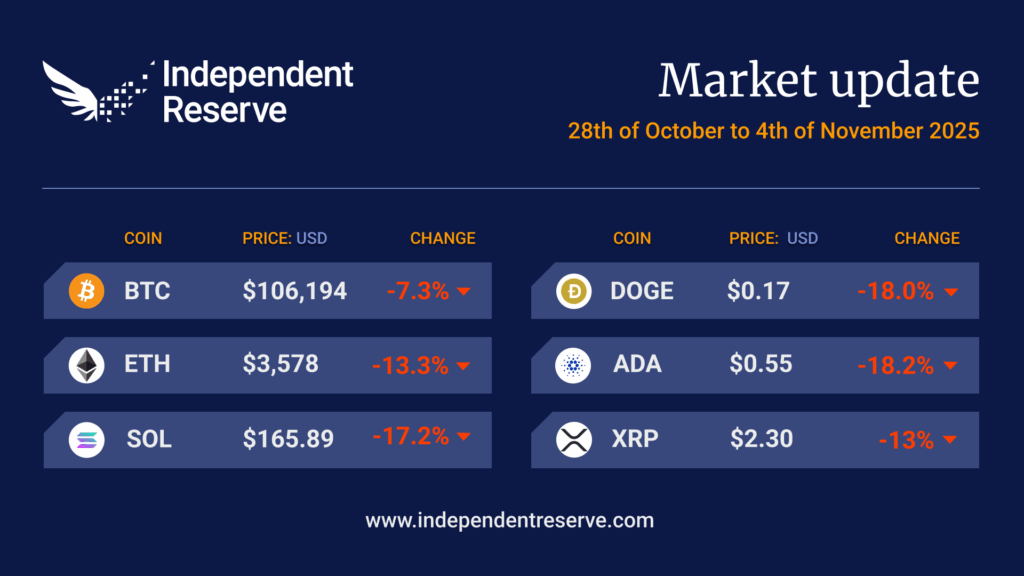In markets
For reasons beyond our control, Uptober had to be cancelled this year – with Moonvember and the Santa Claus Rally now in doubt too. According to CoinDesk, Bitcoin finished the month of October down 8.5%, breaking a six-year-long streak of gains. Long-term hodlers dumped 400,000 Bitcoin across the month, perhaps in anticipation of the four-year cycle ending, as history suggests it might. It was a sad way to mark 17 years since the publication of the Bitcoin White Paper.
Ethereum fell 10% during the month as traders fled to safety, which helped bring about a record A$4.31 trillion (US$2.82T) in stablecoin volume. Even though the flash crash of October 10 was related to tariffs on China, this week’s “amazing meeting” with China and reported tariff deal has not restored confidence. Neither has a US interest rate cut or the news that the US Federal Reserve will end quantitative tightening. Fears over a stock market bubble, the US shutdown, the Balancer hack overnight and unverified rumours Wintermute is suing Binance over the flash crash (and may not be the only firm in trouble) have all contributed to the gloom.
Bitcoin finishes the week down 6.8% to trade around A$162,550 (US$106,194) while Ethereum lost 13% and is back down to A$5,4750 (US$3,578). The rest of the top 10 lost even more, apart from Tron, which only fell 5.4%. There is some hope on the horizon with stablecoin inflows to Binance more than double the usual amount and hitting US$11.2B (US$7.3B), and the HyperUnit whale, who made a killing during the flash crash, has just longed Bitcoin and ETH. The Crypto Fear and Greed Index is at 21 or Fear.

In headlines
Solana ETF goes gangbusters
Bitwise’s Solana ETF was the most successful launch of the year to date, taking in US$197 million (A$301M) in inflows and US$222.9M (A$341M) in seed funding. It ranked 16th in weekly flows across all ETFs. Grayscale’s Solana fund attracted just US$2.2M (A$3.4M) in three days of trading, but $102.7M (A$157M) in seed funding. By contrast, the Ethereum ETFs reversed gains made earlier in the week to finish with just US$16.1M (A$24.6M) extra. Even that was a lot better than the Bitcoin ETFs, which saw US$799M (A$1.2B) in outflows.
$2 trillion in RWAs by 2028
Standard Chartered has released a report forecasting tokenised real-world assets (i.e., shares, bonds, money market funds) growing to a US$2 trillion (A$3.05T) asset class by 2028. Geoffrey Kendrick, the bank’s head of digital assets research, says the majority of those RWAs will be tokenised on Ethereum. One potential threat to the prediction coming true is whether the US Clarity Act is passed.

US crypto market structure bill
It’s possible the Clarity Act may head to a vote before the end of the month, according to Senate Agriculture Committee Chair Republican John Boozman. He’s working with Democrat Senator Cory Booker and plans to release a bipartisan proposal “very, very soon.” “We’re going to get it done this year,” Boozman said. Various members of the Senate Banking Committee report that bipartisan negotiations have resumed, with Sen. Cynthia Lummis crossing her fingers when asked if the bill could get out of committee by Thanksgiving. But Sen. John Kennedy suggested the bill still needs a public hearing and that most senators still don’t understand the issues.
Malaysia tokenisation roadmap
Bank Negara Malaysia has unveiled a three-year roadmap to test out asset tokenisation. The central bank will launch a working group and live pilots to determine foundational use cases that demonstrate clear economic value. Highlighted use cases include tokenised liquidity management and Shariah-compliant finance.
Balancer’s books no longer balance
One of the best-known and trusted DeFi applications, Balancer, has been exploited for more than US$110 million (A$168M) in crypto. Most of the affected funds were various forms of wrapped or staked ETH. The attack occurred due to a faulty access control in its “manage user balance” function, according to Decurity.

A tale of two systems
Hong Kong’s Securities and Futures Commission has lifted a prohibition on platform operators distributing virtual assets without a 12-month track record to professional investors. It’s also relaxing rules to allow local exchanges to share global order books with affiliates overseas. But chair Kelvin Wong Tin-yau doesn’t like “risky” digital asset treasury companies. Over on the mainland, the People’s Bank of China Governor Pan Gongsheng told a conference the existing crypto bans “remain in effect” and the central bank will continue to “crack down on the operation and speculation of virtual currencies within China.” He also takes a dim view of stablecoins.
Vitalik praises ZKSync’s Atlas upgrade
Ethereum creator Vitalik Buterin has praised a forthcoming upgrade to ZKSync that promises to make the L2 composable to with mainnet, and to run at 15,000 TPS. “ZKSync has been doing a lot of underrated and valuable work… Excited to see this come from them!” Called Atlas, L1 assets could reportedly be made instantly available on the L2 and withdrawn instantly too, using ZK proofs.
Consensys IPO
Ethereum co-founder Joe Lubin’s Consensys reportedly intends to list on the stock market, with JPMorgan Chase and Goldman Sachs as lead underwriters for the IPO, according to Axios. It was last valued at US$7 billion (A$10.7B) in 2022. Consensys is effectively the commercial arm of the Ethereum Foundation and operates MetaMask and Infura and backs the ETH treasury company Sharplink Gaming.
The Moonshot Dispatch
Join us every Tuesday at 3 pm (AEDT) for a live market update. Hosted by Lee Eaton and Nick Fletcher, we cover the latest crypto news and price movements. Tune in weekly on Twitter/X, LinkedIn, YouTube, Facebook & TikTok.



